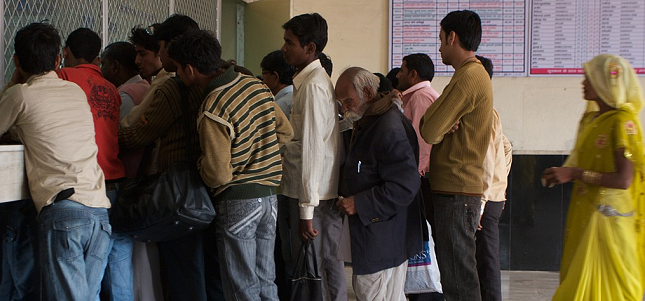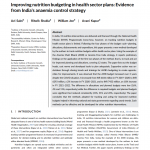
How to Control Over-the-Counter Corruption
10 May 2019
One of the best known simple remedies for corruption has been provided by Robert Klitgaard, an academic and researcher who familiarised himself with how corruption operates in a variety of environments. He made the observation that corruption follows a formula – C equals M plus D, minus A; Corruption equals Monopoly plus Discretion, minus Accountability.
A look at the Klitgaard formula shows that the strategies for reducing corruption are self-evident. Reduce monopoly and discretion, increase accountability, and corruption will decrease.
Do these strategies work in real life? Perhaps in a text-book fashion, when it comes to over the counter or service delivery corruption. While many of the services offered by the government look at first sight to be natural monopolies, it is not beyond the realm of possibility that they can be demonopolised. For instance, telephony services used to be for long a natural monopoly. Only the government offered it. There were long waiting periods and bribery, even though it was of a low order, was widespread. Influence was used for people to jump the queue and linemen were tipped generously to keep the lines in order. Then came the technology revolution of mobile telephony and the monopoly of the government service provider was blown away.
Today, corruption is unknown in the interphase between the citizen and the mobile service provider. The relationship is ruthlessly market driven; citizens have a choice between service providers and that change in the relationship makes corruption impossible at the citizen interphase.
In contrast, one has to only look at the electricity supply or water supply system, which is both networked services that are not yet fully demonopolised. While in the power sector, it is possible for consumers, particularly bulk consumers to have private power supply contracts with generators, the wires that transmit this power is in the hands of a natural monopoly. Most private consumers of power have no choice but to obtain power from the distribution company, which, even if privatised, is a service area monopoly.
Accountability is strengthened only when citizens have stronger rights to demand services and appeal to authorities higher up, in case the service provider does not deliver.
The service area monopoly characteristic of the water supply system is even more markedly a natural monopoly. One does not have a choice of buying water from multiple suppliers, unless one orders water supply by tanker. The pipeline and the water source are both controlled and operated by the same natural monopoly; the water utility concerned. It is therefore no accident that both the electricity supply and water supply systems are corruption prone at the citizens’ interphase. One has to pay bribes for obtaining connections, converting the connection from a temporary one to a permanent one, transferring a connection to another consumer, closing a connection, or increasing the authorised load attached to a connection.
Can such natural monopolies be demonopolised? Yes, of course. If tomorrow technological advances enable electricity to be produced at the consuming point, say by highly decentralised methods such as solar generation, fuel cells or wind energy, then there will be no need for transmission wires. All the corruption associated with the running of the natural monopoly of the wires, will wither away.
Yet, not all service delivery monopolies can be demonopolised. In such cases, doing away with the wide discretion that is available with service delivery providers can reduce corruption dramatically. Ticketing is one area where this approach has worked. Prior to online ticketing being the norm, buying a railway ticket, particularly for long distance travel was a harrowing experience. People hired agents and paid them a commission to have their tickets booked, because they saw the convenience in this approach. The agent knew how to handle the clerk at the counter, or her boss, in order to ensure that tickets were available. Now, with online booking, there is no need for an agent, or the necessity to meet and deal with a clerk who has the discretion to deny or delay your ticket.
Examples abound of services that have rapidly become relatively corruption free, due to the reduction of discretion vested in government officials. Taxation is an area where there has been a great deal of reforms. For the ordinary citizen at least, online filing of returns and supporting documents, followed by automatic examination and refunds if any, flowing directly to their accounts, has reduced the possibility of corruption to a great extent by eliminating interaction with officials, with respect to these transactions.
However, there are many services where neither is it possible for the monopoly character to be reduced, nor is it advisable for discretion vested in an official to be removed completely. In such cases, the best way to reduce corruption is greater vigilance, transparency and oversight. Accountability systems work effectively only when there is a modicum of punishment that befalls the one who transgresses the rules. Furthermore, accountability is strengthened only when citizens have stronger rights to demand services and appeal to authorities higher up, in case the service provider does not deliver.
There are many reforms that have been introduced to increase accountability; they range from making the entitlements of citizens to receive services in a timely fashion legally enforceable, through right to services laws, to mandating transparency with respect to where the service application is pending in the government. The appointment of higher level bodies tasked with dealing with public grievances is also a way of ensuring that accountability systems become stronger.
Do these strategies work automatically, once they are put in place? Obviously they don’t. The onus is still on citizens to make use of these instruments to demand their right to receiving over the counter services without corruption.
In next week’s blog, I will examine case studies where corruption was reduced through intelligent application of Klitgaard’s formula. I will also look at systems where efforts to reduce over the counter corruption did not bear fruit, and other problems were thrown up, as a result.
This blog is part of a series. The first blog can be found here.





